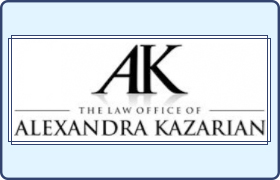 Gardena Juvenile Law Lawyers, California
Gardena Juvenile Law Lawyers, California
Sponsored Law Firm
-
 x
x

Click For More Info:
-
The Law Office of Alexandra Kazarian
15851 Whittier Blvd Whittier, CA 90603» view mapCriminal Law Aggressive & Experienced Criminal Defense
Trust the Law Office of Alexandra Kazarian with your Criminal Defense Case in Whittier & Los Angeles California.
800-773-5851
Lawyers
1-2 of 2 matches
Real Estate Other, Litigation, Juvenile Law, Personal Injury
DUI-DWI, Juvenile Law, Domestic Violence & Neglect, Criminal




 Alexandra Kazarian Whittier, CA
Alexandra Kazarian Whittier, CA AboutAlexandra Kazarian Law Firm
AboutAlexandra Kazarian Law Firm Practice AreasExpertise
Practice AreasExpertise